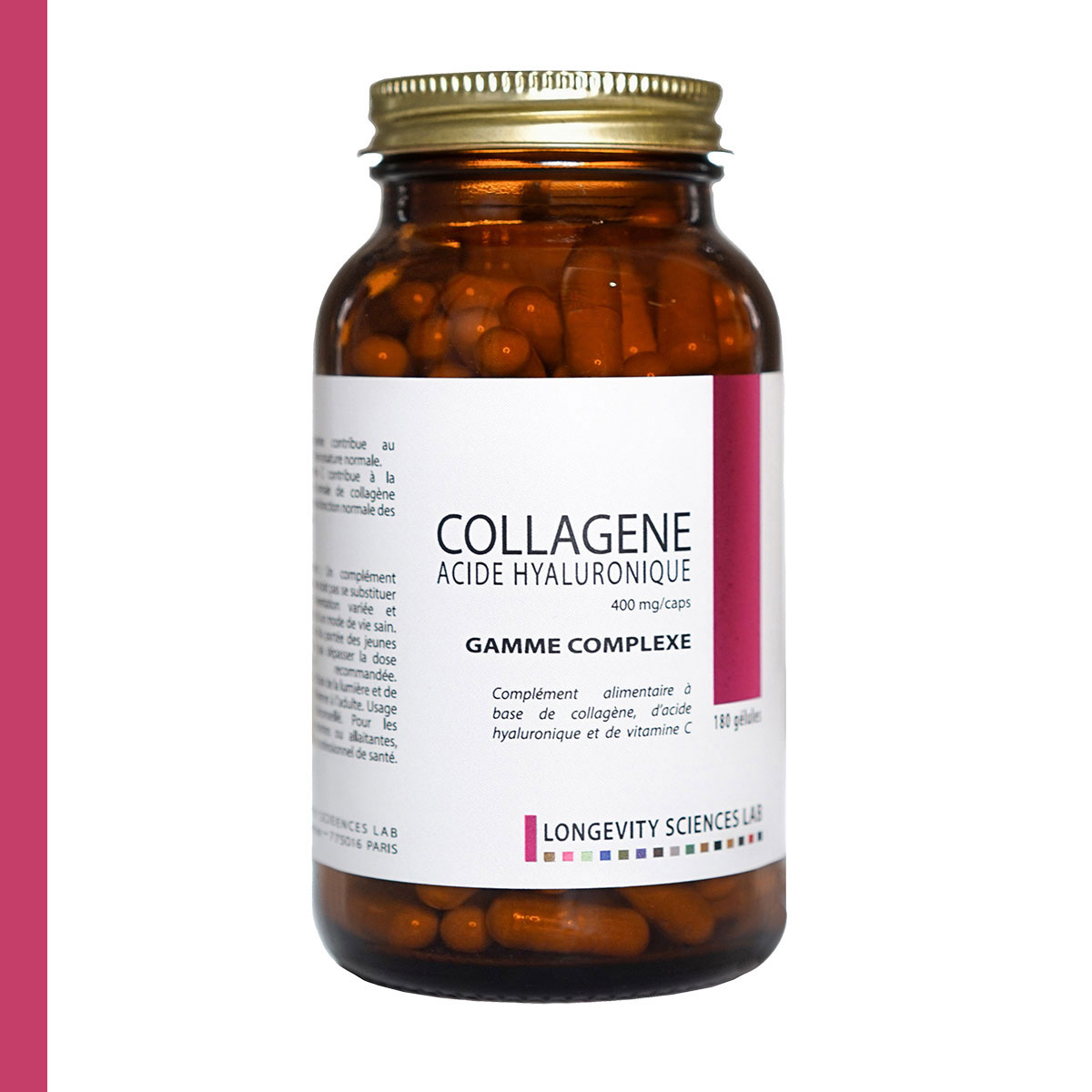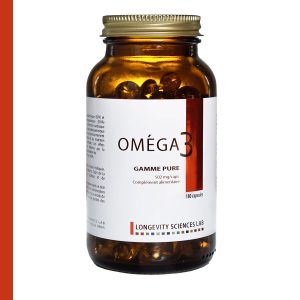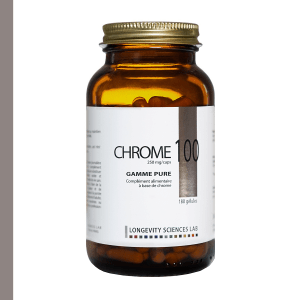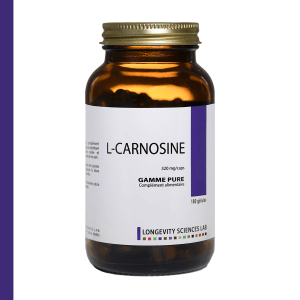Description
Collagen and hyaluronic acid are essential components for the health of the skin, hair, and nails, as well as for joint and bone health.
Here are the properties described in the scientific literature:
- Promotes joint health
- Improves skin health, hydration, and elasticity
- Reduces skin wrinkles
- Relieves joint pain
- Strengthens bones and prevents bone loss
- Boosts metabolism
- Stimulates muscle mass
- Strengthens hair, teeth, and nails
Why choose our product to support your health?
Our products are manufactured in the heart of France, in the Loire Valley.
Through our partner laboratories, all our products are certified organic.
Our product is exclusively composed of natural ingredients and is guaranteed free of additives, GMOs.
The formulation of our products has been studied with the highest expertise to ensure optimal physiological correction for your well-being.
By following the indicated dosage, our physiological corrector will cost you €58 per month.
Invest in your health with Longevity Sciences Lab.
CRITICAL ANALYSIS OF SCIENTIFIC LITERATURE ON COLLAGEN AND HYALURONIC ACID
Collagen improves hydration, elasticity and reduces skin wrinkles
Collagen represents 70% of skin proteins. Collagen synthesis diminishes progressively starting at the age of 25 and this deficit is correlated with a reduction in skin quality that becomes ever thinner, weakens, and loses in flexibility, favoring the appearance of wrinkles year after year. In 2018, a test in South Korea studied the effects of collagen on the skin. The results allowed the researchers to notice that collagen enables wrinkle reduction through improving skin elasticity and supporting water retention to improve hydration (1). Other studies saw the same finding. A regular collagen intake allows to significantly reduce the number of wrinkles. Scientists have also noticed that collagen supplements foster the production of collagen and elastin, proteins assisting skin structure (2;3). Therefore, a regular collagen intake allows not only to reduce the number of wrinkles but is also beneficial to the synthesis of the skin matrix, acting against senescence.
Collagen relieves joint pain and arthrosis
Collagen is a key joint component and insures their cohesion and elasticity. As time goes by, collagen synthesis in joints diminishes, which deteriorates the connective tissue. This collagen loss can be related to joint pain especially during an effort. The results of a recent study done in Germany revealed that a collagen intake reduced significantly the joint pain experienced during physical exercise by athletes, especially in the knee joint (4). The extra collagen could accumulate in the cartilage and could stimulate fibroblasts to produce collagen. This accumulation can reduce the inflammation, can offer a better joint support, and can reduce pain.
A collagen loss can lead to joint pain but also to an increased risk of developing joint problems like arthrosis. This case is linked to wear and tear and is characterized by the joint cartilage destruction and the remolding of the underlying bone. Certain studies suggest that collagen supplements can fight the symptoms of arthrosis and reduce the overall joint pain, like a 2016 study argues. It revealed that an intake of collagen reduced the symptoms in knee arthrosis, by diminishing joint stiffness and pain. A regular collagen intake therefore relieves joint pain (5).
Collagen fights against osteoporosis by preventing bone loss
Collagen is one of the main components of bones and gives them their structure and strength, as an INSERM study conducted in Lyon attests. Starting at the age of 25, collagen synthesis diminishes in bones and leads to a reduction of bone mass. This decrease in bone mass can lead to conditions like osteoporosis, which is defined by a low bone mineral density and generates a higher risk of having broken bones (6).
Studies reveal that collagen supplements can help to inhibit bone degradation, which brings about osteoporosis, by stimulating the proliferation and growth of cartilage cells. Thus, taking extra collagen has a therapeutic effect on osteoporosis, increasing bone mineral density, and has a protective effect on joint cartilage. It also has a relieving effect on pain (7).
Collagen stimulates muscle development and fights against sarcopenia
A study investigated the efficiency of collagen combined to 1-hour resistance sport sessions done three times a week by elderly patients in a sarcopenic state. Sarcopenia is reflected in mass and strength loss. It is attributed to senescence and can be accelerated by a sedentary lifestyle and an unbalanced diet. After three months, the study results confirmed that the sport program associated with the intake of collagen was adapted to significantly increasing muscular mass, muscular strength and human motor control of people suffering from sarcopenia. Moreover, the study demonstrated that a combination of resistance sport exercises with the collagen intake triggered a more visible improvement of body composition. It indeed indicated a significant increase of muscular mass compared to the group that received a placebo. Furthermore, muscular strength was greatly improved after the addition of collagen compared to those in the training program using a placebo (8).
- (1) Do Hun Kim, Hee Chul Chung, Jia Choi, Yasuo Sakai, Boo Yong Lee Oral Intake of Low-Molecular-Weight Collagen Peptide Improves Hydration, Elasticity, and Wrinkling in Human Skin: A Randomized, Double-Blind, Placebo-Controlled Study, Nutrients, June 2018
- (2) Proksch E, Schunck M, Zague V, Segger D, Degwert J, Oesser S: Oral intake of specific bioactive collagen peptides reduces skin wrinkles and increases dermal matrix synthesis, Skin Pharmacology and Physiology, 2014
- (3) & (5) Franchesca D Choi, Calvin T Sung, Margit L.W Juhasz, Natacha A Mesinkovsk Oral Collagen Supplementation: A Systematic Review of Dermatological Applications Journal in Drug Dermatology, January 2019
- (4) Denise Zdzieblik, Steffen Oesser, Albert Gollhofer, Daniel König Improvement of activity-related knee joint discomfort following supplementation of specific collagen peptides, Applied Physiology, Nutrition, and Metabolism, June 2017
- (5) Lugo JP, Saiyed ZM, Lane NE. Efficacy and tolerability of an undenatured type II collagen supplement in modulating knee osteoarthritis symptoms: a multicenter randomized, double-blind, placebo-controlled study, Nutrition Journal, January 2016
- (6) Patrick Garnero, The Role of Collagen Organization on the Properties of Bone. April 2017
- (7) Gustavo Fanaro Collagen supplementation as a complementary therapy for the prevention and treatment of osteoporosis and osteoarthritis: a systematic review, Revista Brasileira de Geriatria e Gerontologia, March 2016
- (8) D Zdzieblick, S Oesser, MW Baumstark, Collagen peptide supplementation in combination with resistance training improves body composition and increases muscle strength in elderly sarcopenic men: a randomised controlled trial, The British Journal of Nutrition, October 2015






